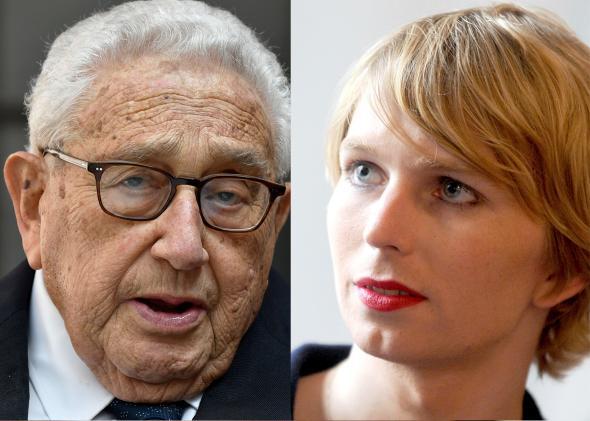Harvard’s Kennedy School of Government has a tradition of inviting political and media figures to become “visiting fellows” for short periods of time, which means they hang around campus appearing on panels and falling in love with Minnie Driver and such. This fall, the school invited Chelsea Manning—the Army whistleblower whose prison sentence for leaking sensitive documents was commuted by President Obama in January—to be one of these fellows. Various national security figures attacked the appointment, and CIA Director Mike Pompeo skipped a Thursday speech at Harvard in protest. On Friday, Kennedy school dean Doug Elmendorf announced that he had revoked Manning’s fellowship, writing that “many people view a Visiting Fellow title as an honorific” and that he had failed to properly consider how honoring Manning in such a way “fulfills the values of public service to which we aspire.”
As has been noted elsewhere, the decision to formally bail on Manning implies the perverse continued endorsement of the “public service” rendered by another current visiting fellow, Corey Lewandowski, the corrupt, screaming thug who helped launch and run the most racist, anti-democratic presidential campaign in modern history. But Elmendorf’s statement is also interesting in light of Harvard’s friendly relationship with Henry Kissinger—a triple graduate of the institution who has been celebrated by its august dons, including Kennedy School professors, and hosted on more than one occasion on campus. (The Kennedy School scheduled another event with him earlier this year, but it was postponed.)
Manning, of course, committed the crime of leaking sensitive information, but there is no evidence that any U.S. service member or citizen died as a result of her disclosures. It’s been established in mainstream works of history, though, that Kissinger leaked nonpublic information about President Lyndon Johnson’s 1968 Vietnam peace talks to the Nixon campaign. Nixon subsequently sabotaged the talks under the belief that their failure would help his chances in the election. The U.S.’s involvement in Vietnam then continued until 1975, during which time more than 21,000 U.S. service members lost their lives.
Now, it’s impossible to know whether Johnson’s peace initiative would have been successful if Kissinger and Nixon hadn’t tried to ruin it. But it is possible to say that sabotaging American diplomacy by leaking information to Richard Nixon is not good “public service.” Harvard’s Kennedy School of Government, j’accuse!
